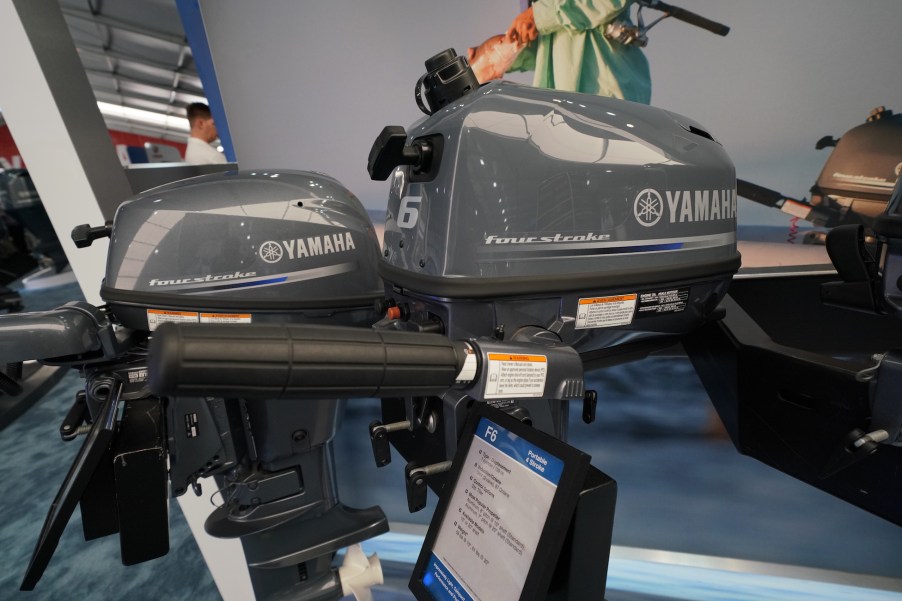
What Size Motor Is Right for Your Boat?
If you’re looking to get out on the water regularly, you’ll want to make sure you have a boat with the appropriate amount of power to give you the best trip possible. The weight and horsepower of your boat’s engine can significantly impact the boat’s performance and maintenance needs and can make or break your nautical adventures. Here’s how to ensure you power your boat correctly, according to Discover Boating.
How to choose an appropriately sized engine for your boat
Although settling on an engine size may seem somewhat intimidating if you’ve never purchased a boat before, it’s fortunately a fairly straightforward process. The boats you look at should be rated for the maximum horsepower they can handle, and this is always the amount you should aim for.
While you certainly don’t want to get a motor that’s too big for your boat, it’s absolutely better to go bigger rather than going too small. In fact, Discover Boating reports that most often, low horsepower is the reason people experience a disappointing ride experience when they go out on the water. Speak to your dealer about the largest motor possible and go with that.
Motor size really does matter
Bigger motors and higher horsepower have a long list of benefits when it comes to boating. First and foremost, you’ll get more speed, making for more exhilarating rides. However, there’s much more to it than that.
Bigger motors provide better handling, especially at midrange speeds. This means that water skiing and other sports will be easier, and you’ll have a better time maneuvering in general. In rough weather, larger motors can prove particularly useful, giving you more control and security in choppy conditions.
Another perk of a larger motor is, counterintuitively, the fact that it uses less fuel, according to Discover Boating. While it’s easy to assume that a smaller motor will be more fuel-efficient, this is actually not the case. A motor that is too small will struggle to power the boat and will, therefore, eat up significantly more fuel. A larger motor may have a bigger fuel tank, but it will go through this fuel more slowly, as it is not struggling to power a boat that is too heavy.
What you should keep in mind, however, are official regulations. According to Formula Boats. You should be aware to base your motor selection based on the “rule of thumb,” which states that you should have between 40 and 25 pounds of weight per horsepower. Also, keep in mind the manufacturer’s plate capacity that is specified for your specific boat.
The manufacturer should be following federal guidelines to determine the maximum horsepower capacity, and that number should be listed for you on the boat. Any powerboat that’s less than 20 feet in length is required to have that capacity plate available for you.
Finally, always remember that it’s illegal to overpower your boat, so while bigger is better in a lot of circumstances, you can’t go too big.
The downsides of going too small
Related: 4 Classic Mistakes to Avoid When Towing a Boat
According to Discover Boating, you should be wary of a boat with a smaller motor that seems to do well during a test ride. Take note of the fact that during your test ride, you will probably have a limited number of passengers, and will have no extra drinks, food, or sporting gear. You may not even have a full fuel tank.
All of these factors lighten the load, making it so the watercraft can perform decently even with fewer horsepower. However, this isn’t necessarily indicative of how you will be using the boat the majority of the time. That is why it’s important to find out the maximum amount of power the watercraft can handle — this rating will account for how much weight the boat could potentially be taking on with a full passenger load, and will, therefore, be a more accurate gauge of the power you’ll need.
Which specific type of engine you end up with will depend largely on the type of watercraft and the areas in which you’ll be sailing. Horsepower can range anywhere from 2.5 hp all the way up to over 1,000 hp for certain types of outboard motors.
Choosing the appropriate engine size for your boat will make it that much easier for you to enjoy your time out on the water. Make sure you go with the highest amount of horsepower that your boat can handle, and it’ll be smooth sailing all summer long.


